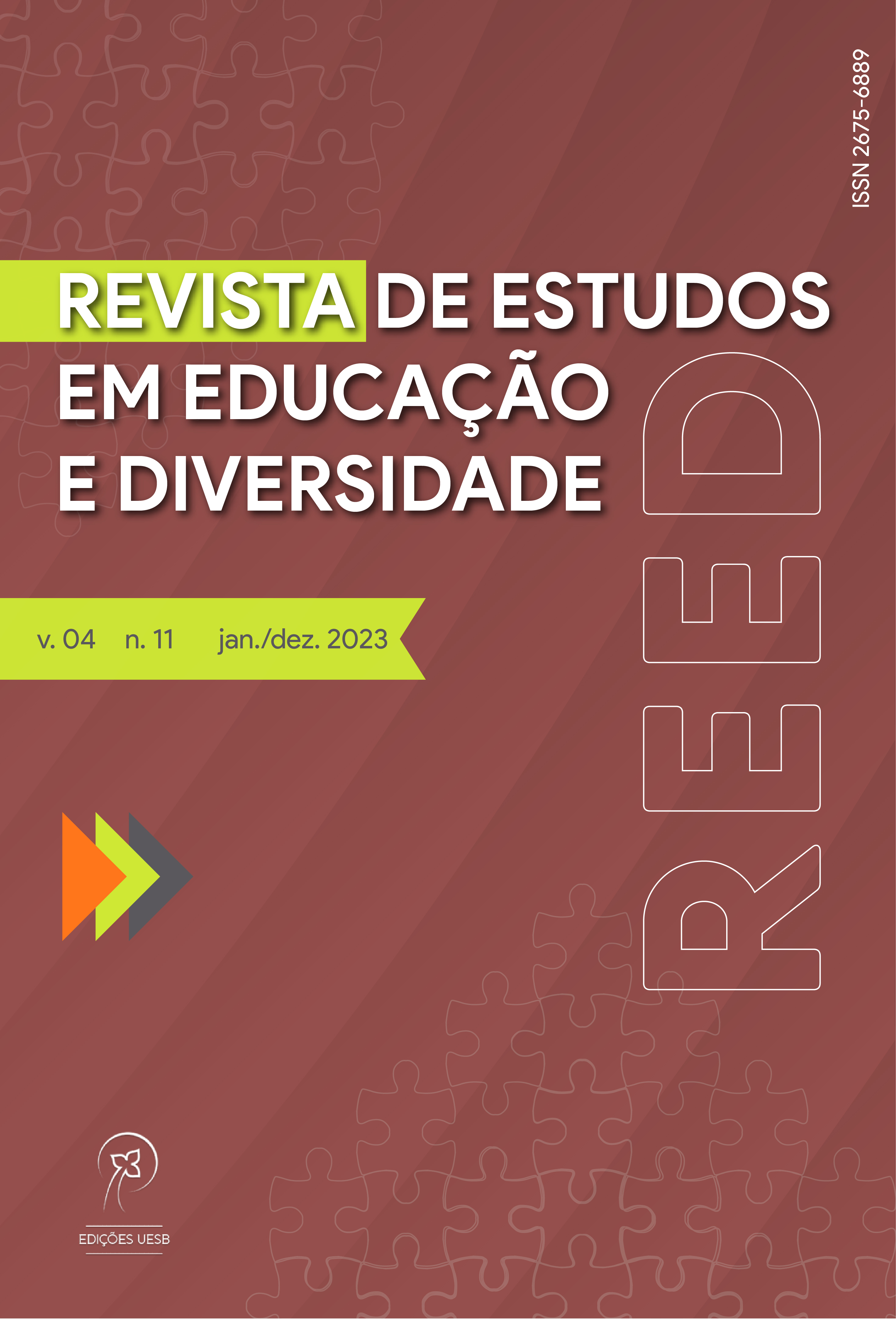Perspectives from students from a school in Feira de Santana on the practical experiment on polymers
DOI:
https://doi.org/10.22481/reed.v4i11.14040Keywords:
scientific literacy, practical classroom, pedagogical residencyAbstract
The teaching of science is one of its objectives for scientific literacy of students, providing knowledge of two concepts, understanding of the scientific method and the impact of technology on society. It promotes the development of critical thinking and enables students to engage effectively in society. To achieve this objective, teachers need to use resources and methodologies that awaken the interest of students and facilitate their understanding of content. Experimentation in the classroom is a valuable resource to make science teaching more dynamic and participatory, allowing students to build their own knowledge. The pedagogical residency program aims to improve the training of teachers, providing graduates with the opportunity to experience practical experiences in schools, under the supervision of a preceptor teacher. The objective of this study is to investigate the perception of two students about the performance of practical activities and their use in the discipline of chemistry in basic education. For this purpose, students in the third year of secondary education will participate in a practical experience related to polymers outside the school laboratory. Ember a majority dos alunos have reported increased interest and ease in understanding two contents após atividade practice, as questions em uma prova subsequently show an unsatisfactory level of achievement. The results suggest that, in order to improve experimental practice and to understand the students' interest, there are still challenges to be overcome to guarantee more effective learning in the classroom.
Downloads
References
ARAGÃO, Susan Bruna Carneiro. A Alfabetização Científica na formação inicial de professores de Ciências: análise de uma Unidade Curricular planejada nessa perspectiva. 2019. Tese de Doutorado. Tese de doutorado, Universidade de São Paulo, 2019.
ARRIGO, Viviane.; ALEXANDRE, Mara Cristina Lalli.; ASSAI, Natany Dayani de Souza. O ensino de química e a educação ambiental: uma proposta para trabalhar conteúdos de pilhas e baterias. Experiências em ensino de ciências, Cuiabá, v. 13, n. 5, p. 306-325, 2018.
CORDEIRO, Thaíse Conceição.; SHAW, Gisele Soares Lemos. Interdisciplinaridade no ensino de ciências: Concepções de licenciandos em Ciências da Natureza e a influência do Programa Institucional de Residência Pedagógica da UNIVASF. Formação Docente–Revista Brasileira de Pesquisa sobre Formação de Professores, Belo Horizonte, v. 15, n. 32, p. 87-104, 2023.
DRIVER, Rosalind et al. Construindo conhecimento científico na sala de aula. Química Nova na Escola, São Paulo, n. 9, p. 31-40, 1999.
FARIA, Juliana Batista.; DINIZ, Júlio Emílio Pereira. Residência pedagógica: afinal, o que é isso? Revista de Educação Pública, Cuiabá, v. 28, n. 68, p. 333-356, maio 2019. Disponível em: https://doi.org/10.29286/rep.v28i68.8393. Acesso em 20 set. 2023.
FAZENDA, Ivani Catarina Arantes. Integração e interdisciplinaridade no ensino brasileiro: efetividade ou ideologia? 6. ed. São Paulo-SP: Edições Loyola, 2011.
FIGUEIREDO, Paulo Vitor.; MACHADO, Angelita.; ROBAERT, Samuel. A Experimentação através de uma abordagem investigativa para a Construção do conhecimento químico. In: ENCONTRO DE DEBATE EM ENSINO DE QUÍMICA-EDEQ, 37., 2017, Porto Alegre, RS. Anais [...]. Porto Alegre, RS: FURG, 2017. Disponível em: https://edeq.furg.br/images/arquivos/trabalhoscompletos/s07/ficha-74.pdf. Acessado em 02 de dezembro de 2023.
GALIAZZI, Maria do Carmo.; ROCHA, Jusseli Maria de Barros.; SCHMITZ, Luiz Carlos.; SOUZA, Moacir Langoni de.; GIESTA, Sérgio.; GONÇALVES, Fábio Peres. Objetivos das atividades experimentais no ensino médio: a pesquisa coletiva como modo de formação de professores de ciências. Ciência & Educação, São Paulo, n. 7, v. 2, p. 249-263, 2001.
LIMA, Jane Helen Gomes.; SIQUEIRA, Ana Paula Pruner de.; COSTA, Samuel. A utilização de aulas práticas no ensino de ciências: um desafio para os professores. Revista Técnico-Científica do IFSC, Santa Catarina, p. 486-486, 2013.
LIMA, D. B.; GARCIA, R. N. Uma investigação sobre a importância das aulas práticas de Biologia no Ensino Médio. Cadernos de Aplicação, Porto Alegre, v. 24, n. 1, 2011. Disponível em: https://doi.org/10.22456/2595-4377.22262. Acesso em: 2 dez. 2023.
MILLER, Jon D. Scientific literacy: a conceptual and empirical review. Daedalus: Journal of the American Academy of Arts and Sciences, v. 112, n. 12, p. 29-48, 1983.
PANIZZOLO, Claudia et al. Programa de Residência Pedagógica da UNIFESP: avanços e desafios para a implantação de propostas inovadoras de estágio. Políticas de Formação Inicial e Continuada de Professores. In: ENCONTRO NACIONAL DE DIDÁTICA E PRÁTICAS DE ENSINO, 16, 2012, Campinas, SP, Anais [...]. Campinas- SP, 2012.
SALESSE, Anna Maria Teixeira. The experimentation in the Chemistry Teaching: the importance of practical classes in the learning process. 2012. 39f. Monografia (Especialização em Educação: Métodos e Técnicas de Ensino). Universidade Tecnológica Federal do Paraná, Medianeira, 2012.
SANTOS, Vanessa da Silva. Importância das aulas práticas de química: Estudo de caso numa escola de tempo integral. Scientia Naturalis, Rio Branco, v. 3, n. 4, p.1805 -1813, 2021.
SANTOS, Wildson Luiz Pereira dos. Educação científica na perspectiva de letramento como prática social: funções, princípios e desafios. Revista Brasileira de Educação, São Paulo, v. 12, p. 474-492, 2007.
Downloads
Published
How to Cite
Issue
Section
License
Copyright (c) 2023 Revista de Estudos em Educação e Diversidade - REED

This work is licensed under a Creative Commons Attribution 4.0 International License.
You are free to:
Share - copy and redistribute the material in any medium or format; Adapt - remix, transform, and build from the material for any purpose, even commercially. This license is acceptable for Free Cultural Works. The licensor cannot revoke these freedoms as long as you follow the terms of the license.
Under the following terms:
Attribution - You must appropriately give credit, provide a link to the license, and indicate if any changes have been made. You may do so in any reasonable way, but not in a way that suggests that you or your use is endorsed by the licensor.
There are no additional restrictions - You cannot apply legal terms or technological measures that legally restrict others to make any use permitted by the license.






